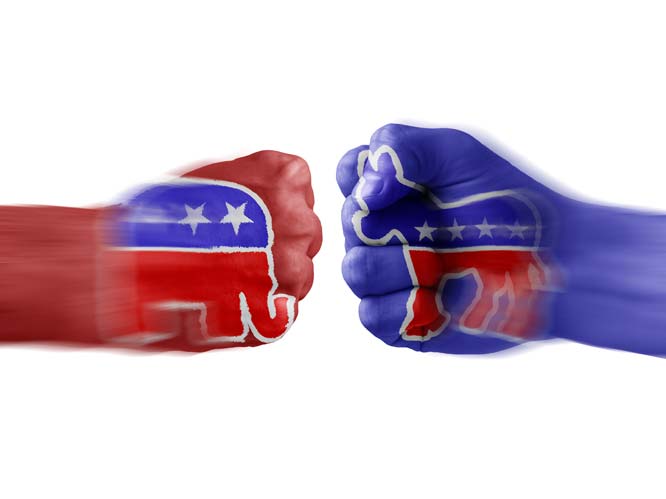
This line of argument holds that a Supreme Court decision overturning Roe v. Wade, which made abortion a constitutional right in the U.S. 45 years ago, would be a disaster for the party. Anti-abortion politicians, no longer able simply to make rhetorical stands, would be pressed by their supporters to enact actual bans on abortion - and that prospect would awaken a pro-choice majority that has been complacent under Roe. A voter backlash would both preserve legal abortion and exile Republicans from office.
The argument continues: Because a lot of Republicans understand the danger, they do not truly want to see Roe go. That political judgment helps to explain why several Republican appointees to the Supreme Court have voted to reaffirm Roe, and why it may survive even when one of the pro-Roe Republicans, Justice Anthony Kennedy, is replaced.
The backlash argument can't be dismissed out of hand. Maybe some Republican-appointed justices have been moved by this theory, although it would be a violation of their oaths of office to take such purely partisan considerations into account. It is surely true that some people who favor legal abortion have not voted based on the issue because it seems secure, and would be alarmed by the end of Roe and proposals to ban abortion after it.
But most voters aren't solidly pro-choice, just as most voters aren't solidly anti-abortion. Public ambivalence means that the political fallout if Roe were repealed would depend on what each side's activists did next.
Ending Roe would put abortion policy in the hands of legislatures. (No justice of the Supreme Court has ever expressed agreement with the idea that the Constitution itself prohibits abortion.)
Congress would probably stalemate. Opponents of abortion have not only been unable to get a comprehensive ban on it through Congress. They have also failed to get abortion outlawed after 20 weeks of pregnancy.
Sweeping national change would be off the table. In places where a disproportionate percentage of the country's pro-choice voters live, such as California, new restrictions on abortion would not be likely either. Some state supreme courts would enforce their own mini-Roes, based on inventive interpretations of their state constitutions. These facts should undercut any fears that a post-Roe America would be a dystopia out of "The Handmaid's Tale."
In red and especially in purple states, abortion opponents could easily go too far, just as the Roe-backlash theory predicts. A lot of them would want to push for a ban on nearly all abortions as soon as the Supreme Court allows it. That's what they believe justice requires.
In other places, they would work more incrementally, tightening the restrictions on late-term abortion and regulating abortion clinics more heavily. They would use the law to make abortion an ever-more marginal practice, as they have been doing even while Roe has been on the books. If they followed that course, it's pro-choice Democrats who would be on the defensive.
My guess is that abortion opponents would choose different approaches in different places, and would debate the question vigorously and sometimes bitterly. The maximalists would accuse the incrementalists of selling out unborn children and being too timid.
The incrementalists would say the maximalists are setting back the cause of protecting unborn children by not being realistic. In some places, the maximalist course would have to be tried and to fail politically before anti-abortion realism won the day.
It is also possible that the Supreme Court will overturn Roe piece by piece, giving the incrementalists the upper hand among anti-abortion activists. In that case the likelihood of a powerful backlash against anti-abortion Republicans would be small.
The scenario we can assume will not happen is that abortion opponents will go too far, there will be a backlash, and then the issue will be settled for all time. After five decades of contention about abortion that have included several very low points for abortion opponents, there is no reason them to accept defeat and vanish.
As long as I'm writing about a hypothetical situation - what happens if the Supreme Court strikes down Roe - let me speculate a little more. By nationalizing abortion policy, the court contributed to the polarization of the parties on the issue. If you wanted a future in national politics as a Republican, it became increasingly important to oppose abortion. Ambitious Democrats had to be down-the-line supporters of legal and subsidized abortion.
If abortion becomes a predominantly state issue, the party lines might relax. Republicans in blue states and Democrats in red states might be able to take the same views as their voters a bit more often. Religious conservatives who have stuck with the Republicans because of abortion but dislike its economic agenda might feel freer to vote for Democrats - and social liberals who dislike the Democratic economic platform might be more willing to vote for Republicans.
Roe changed the makeup of both parties and its end could change them again. On balance, the change Roe wrought has helped the Republicans. It's one of the reasons they have more power than they have since before the Great Depression.
If the overturning of Roe makes traditionalists less inclined to vote for politicians based on social issues, it could undo some of the party's gains. The end of Roe could hurt Republicans, then, less by causing a backlash than by nullifying part of its coalition's reason for being.
Ramesh Ponnuru has covered national politics and public policy for 18 years. He is an author and Bloomberg View columnist.


 Contact The Editor
Contact The Editor
 Articles By This Author
Articles By This Author